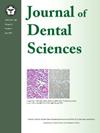趋化因子受体-2 缺乏会诱发小鼠轻度实验性根尖周病变
IF 3.4
3区 医学
Q1 DENTISTRY, ORAL SURGERY & MEDICINE
引用次数: 0
摘要
背景/目的巨噬细胞被认为在慢性根尖牙周炎(CAP)的发展中起重要作用。然而,组织常驻巨噬细胞在CAP中的功能尚不清楚。本研究旨在探讨不同来源的巨噬细胞在cap中的潜在作用。材料和方法采用图式因子受体-2缺乏(CCR2−/−)小鼠和C57BL/6N小鼠(对照组,WT小鼠)诱导根尖牙周炎。双侧下颌第一磨牙牙髓暴露于口腔环境。分别于牙髓爆炸0、7、21、28天后处死动物,采集下颌骨,用micro-CT扫描,进一步进行HE处理;免疫组化染色分析CAP的发展,以及巨噬细胞表面标志物的表达。结果CCR2−/−和WT小鼠在正常根尖周围均可见CCR2阴性巨噬细胞,表明存在组织常驻巨噬细胞。CCR2缺乏使根尖周病变内巨噬细胞数量减少,M1型巨噬细胞数量减少,病变边缘破骨细胞数量较野生型减少。与野生型相比,CCR2缺乏明显减少了根尖周围病变的体积,但没有完全抑制和消失病变。结论单核-巨噬细胞系统源性巨噬细胞促进了根尖周病变的进展,而牙周韧带组织内的巨噬细胞也可能参与了根尖周病变的进展。本文章由计算机程序翻译,如有差异,请以英文原文为准。
Chemokine receptor-2 deficiency induced mild experimental periapical lesion in mice
Background/purpose
Macrophages are considered to play an important role in the development of chronic apical periodontitis (CAP). However the function of tissue resident macrophages in CAP is unclear. This study aims to investigate the potential role of macrophages of different origins in CAP.
Materials and methods
Chemokine receptor-2 deficiency (CCR2−/−) mice and C57BL/6N mice (control group, WT mice) were used to induce apical periodontitis. The pulp of mandibular first molars of both sides were exposed to the oral environment. After 0, 7, 21, 28 days of pulp explosion, animals were sacrificed, the mandibular bones were collected and scanned with micro-CT, further processed for HE & IHC Staining to analyze the development of CAP, as well as the expression of surface markers of macrophages.
Results
Both CCR2−/− and WT mice exhibited CCR2 negative macrophages in normal periapical area, which indicated the presence of tissue resident macrophages. CCR2 deficiency decreased the number of macrophages in periapical lesions, the M1 type macrophages’ number as well as osteoclasts around the edge of the lesion decreased compared to wild type. Meanwhile CCR2 deficiency decreased the volume of periapical lesion significantly compared to wild type, but did not inhibite and disappeare the lesion thoroughly.
Conclusion
Monocyte-macrophage system derived macrophages promote the progression of periapical lesions, while tissue resident macrophages in periodontal ligament might also be involved in the progression of periapical lesion.
求助全文
通过发布文献求助,成功后即可免费获取论文全文。
去求助
来源期刊

Journal of Dental Sciences
医学-牙科与口腔外科
CiteScore
5.10
自引率
14.30%
发文量
348
审稿时长
6 days
期刊介绍:
he Journal of Dental Sciences (JDS), published quarterly, is the official and open access publication of the Association for Dental Sciences of the Republic of China (ADS-ROC). The precedent journal of the JDS is the Chinese Dental Journal (CDJ) which had already been covered by MEDLINE in 1988. As the CDJ continued to prove its importance in the region, the ADS-ROC decided to move to the international community by publishing an English journal. Hence, the birth of the JDS in 2006. The JDS is indexed in the SCI Expanded since 2008. It is also indexed in Scopus, and EMCare, ScienceDirect, SIIC Data Bases.
The topics covered by the JDS include all fields of basic and clinical dentistry. Some manuscripts focusing on the study of certain endemic diseases such as dental caries and periodontal diseases in particular regions of any country as well as oral pre-cancers, oral cancers, and oral submucous fibrosis related to betel nut chewing habit are also considered for publication. Besides, the JDS also publishes articles about the efficacy of a new treatment modality on oral verrucous hyperplasia or early oral squamous cell carcinoma.
 求助内容:
求助内容: 应助结果提醒方式:
应助结果提醒方式:


